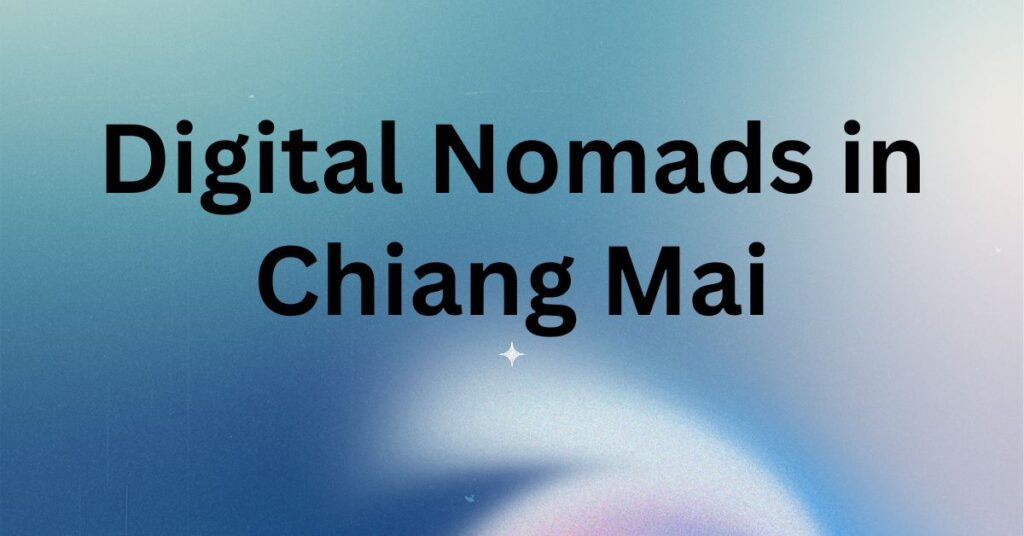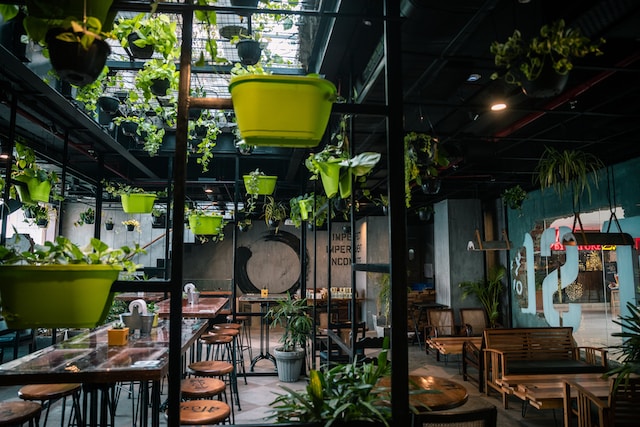Digital Nomads in Chiang Mai – Ultimate Guide

In recent years, a new breed of professionals has emerged, known as digital nomads, who are able to work remotely from anywhere in the world with just a laptop and an internet connection.
As a result, many have decided to take their work on the road and explore different parts of the world. One of the most popular destinations for digital nomads is Chiang Mai, Thailand.
In this article, we will explore why Chiang Mai has become a hub for digital nomads, and provide a comprehensive guide for those who are considering Chiang Mai as their next destination.
We will cover everything from coworking spaces and accommodation options to the digital nomad community and explore the best things to do and see in Chiang Mai.
Whether you’re a seasoned digital nomad or just starting out, this guide will help you make the most of your time in Chiang Mai.
Why Chiang Mai is a popular destination for digital nomads
There are many reasons why Chiang Mai has become a popular destination for digital nomads. Firstly, the city has a low cost of living compared to other cities in the world, making it an affordable place for digital nomads to live and work.
Additionally, Chiang Mai has a warm climate, with temperatures ranging from 15-35°C throughout the year, making it an ideal place to escape cold winters or hot summers.
Furthermore, Chiang Mai has a strong digital nomad community, with many events and meetups happening regularly.
The city is also home to a variety of coworking spaces and cafes that are specifically designed for remote workers, making it easy to find a comfortable and productive workspace.
In addition to all of these practical reasons, Chiang Mai has a unique culture and history, with plenty of temples, markets, and natural beauty to explore.
All of these factors combined make Chiang Mai an attractive destination for digital nomads looking for a balance of work and play in a vibrant community.
Coworking spaces and cafes for digital nomads in Chiang Mai
Chiang Mai is home to a variety of coworking spaces and cafes that cater to digital nomads. Here’s an overview of the different options available:
Overview of the coworking spaces and cafes in Chiang Mai

1. Coworking Spaces:
Punspace: Punspace is one of the most popular coworking spaces in Chiang Mai, with two locations in the city. The spaces are well-designed and equipped with all the amenities that a digital nomad needs, such as high-speed internet, meeting rooms, and printing facilities.
Mana Co-Working Space: Located in the heart of the city, Mana Co-Working Space is another popular option for digital nomads. The space is bright and airy, with comfortable chairs and desks, and it’s equipped with high-speed internet, printing facilities, and a kitchen.
CAMP: CAMP is a coworking space located in the trendy Nimmanhaemin neighborhood. It’s a great option for those who like to work in a more creative and relaxed environment. The space is equipped with all the amenities you need, including high-speed internet, printing facilities, and a coffee bar.
2. Cafes:
Ristr8to: Ristr8to is a popular cafe chain in Chiang Mai, known for its great coffee and cozy atmosphere. The cafe has several locations around the city, and they all offer free high-speed internet.
Graph Cafe: Graph Cafe is a great option for those who like to work in a quiet and peaceful environment. The cafe has a minimalistic design, with plenty of natural light, and it’s equipped with high-speed internet.
Nine One Coffee: Nine One Coffee is a trendy cafe located in the Old City. It’s a great place to work and relax, with a laid-back atmosphere and comfortable seating. The cafe also has high-speed internet and serves great coffee and food.
Overall, there are plenty of options for digital nomads in Chiang Mai, whether you prefer a coworking space or a cafe. Each option has its own advantages and disadvantages, so it’s worth trying out a few different places to find the one that works best for you.
Advantages and disadvantages of each option
Coworking Spaces:
- Punspace
Advantages:
- Offers a range of workspace options, from hot desks to private offices
- Hosts community events and networking opportunities
- Has two convenient locations in Chiang Mai
Disadvantages:
- Can be crowded and noisy during peak hours
- Membership fees are relatively expensive compared to some other coworking spaces in the area
- The Coworking Space by 9th Street
Advantages:
- Located in a trendy area with plenty of restaurants and cafes nearby
- Offers a cozy and welcoming atmosphere
- Has a cafe on-site serving coffee and snacks
Disadvantages:
- Has limited workspace options compared to some other coworking spaces in the area
- Can be noisy at times due to its location near a busy street
- MANA Coworking
Advantages:
- Located in the heart of the old city with easy access to shops and restaurants
- Offers a range of workspace options, including private offices
- Has a rooftop terrace with stunning views of the city
Disadvantages:
- Can be quite busy and crowded during peak hours
- The rooftop terrace may not be suitable for those who are sensitive to heat or noise
- C.A.M.P.
Advantages:
- Emphasizes creativity and collaboration
- Hosts a variety of events and workshops to encourage community building
- Offers a range of workspace options, including private offices
Disadvantages:
- Can be crowded and noisy during peak hours
- May not be suitable for those who prefer a more traditional office environment
Cafes:

- Graph Cafe
Advantages:
- Fast Wi-Fi and ample power outlets
- Comfortable seating
- Serves coffee and light snacks
Disadvantages:
- Can be crowded and noisy during peak hours
- Limited food options
- The Barisotel by The Baristro
Advantages:
- Cozy atmosphere
- Serves excellent coffee and food
- Located in a trendy area with plenty of shops and restaurants nearby
Disadvantages:
- Limited workspace options
- May not be suitable for those who prefer a more traditional office environment
- Ristr8to
Advantages:
- High-quality coffee and latte art
- Multiple locations in Chiang Mai, each with its own unique atmosphere
- Comfortable seating and fast Wi-Fi
Disadvantages:
- Limited food options
- Can be crowded and noisy during peak hours
- Bake and Bite
Advantages:
- Serves delicious pastries, sandwiches, and coffee
- Multiple locations in Chiang Mai, each with its own unique charm
- Comfortable seating and fast Wi-Fi
Disadvantages:
- Limited workspace options
- Can be crowded and noisy during peak hours
Recommendations and tips
Here are some recommendations and tips to consider when choosing between coworking spaces and cafes in Chiang Mai:
Consider your work needs: If you need a dedicated workspace, access to meeting rooms, and other amenities such as printers and scanners, then a coworking space may be the better option for you. However, if you only need a casual workspace with fast Wi-Fi and the ability to purchase food and drinks, then a cafe may be more suitable.
Look for a convenient location: Choose a coworking space or cafe that is conveniently located to your accommodation or transportation options. This will save you time and make your workday more efficient.
Check the pricing options: Compare the pricing options for each coworking space or cafe to determine which one fits your budget. Some coworking spaces may offer discounts for long-term memberships or have different pricing options for dedicated desks and private offices.
Accommodation for digital nomads in Chiang Mai
Chiang Mai is a popular destination for digital nomads, and there are many accommodation options available to suit different budgets and preferences. Here are some recommendations for accommodation for digital nomads in Chiang Mai:
Nimman area: This is a trendy area popular with digital nomads, and there are many guesthouses and serviced apartments available. Some popular options include Stay With Nimman, The Nimman House, and 99 The Heritage Hotel.
Old City area: The Old City is a popular tourist area with many cultural attractions, and there are also many guesthouses and serviced apartments available. Some popular options include De Naga Hotel Chiang Mai, Rinn Boutique House, and Baan Klang Vieng.
Santitham area: This area is popular with long-term digital nomads, and there are many apartment buildings and guesthouses available. Some popular options include V Lodge, The Brick Guesthouse, and Baan Thai Apartment.
Chang Phueak area: This area is located close to the university and has a more relaxed atmosphere, with many guesthouses and serviced apartments available. Some popular options include Stay with Huen Pha Kaew, The Opium Chiang Mai, and Baan San Petch.
South of Chiang Mai: This area is located a bit further away from the city center, but it offers a quieter and more natural environment. Some popular options include The Nest Chiang Mai, Baan Suan Him Doi, and Aum Hum Homestay.
Overview of the accommodation options for digital nomads in Chiang Mai
Chiang Mai offers a wide range of accommodation options for digital nomads, from budget guesthouses to luxury serviced apartments. Here is an overview of some of the most popular accommodation options for digital nomads in Chiang Mai:
Guesthouses: Guesthouses are a popular option for budget-conscious digital nomads. They offer basic accommodations such as private rooms with shared bathrooms or dormitory-style accommodations. Guesthouses typically have a communal area where guests can socialize and work.
Serviced apartments: Serviced apartments offer more spacious and private accommodations than guesthouses. They are fully furnished and come with amenities such as Wi-Fi, air conditioning, and kitchen facilities. Some serviced apartments also offer cleaning services and other amenities.
Co-living spaces: Co-living spaces are a relatively new concept in Chiang Mai and offer a unique experience for digital nomads. They offer private rooms and shared communal spaces such as kitchens, living rooms, and co-working spaces. Co-living spaces also offer community events and networking opportunities.
Hotels: Hotels offer a range of accommodations from budget to luxury. They typically offer private rooms with en-suite bathrooms and amenities such as Wi-Fi, air conditioning, and room service.
Hostels: Hostels offer budget accommodations such as dormitory-style rooms with shared bathrooms. They typically have a communal area where guests can socialize and work.
Airbnb: Airbnb is a popular option for digital nomads who want a more home-like experience. You can rent an entire apartment or house or a private room in someone’s home.
Best neighborhoods for digital nomads
Santitham: Santitham is a residential neighborhood located north of the city center. It’s popular with long-term digital nomads who want a quieter, more local experience. This neighborhood is home to several co-working spaces, including Punspace Tha Phae Gate and The Hive.
Hang Dong: Hang Dong is located south of the city and offers a more rural experience. It’s popular with digital nomads who want to be close to nature and away from the hustle and bustle of the city. This neighborhood is home to several co-working spaces, including The Brick and Fullstack Coworking Space.
Short-term vs. long-term accommodation options
Chiang Mai offers both short-term and long-term accommodation options for digital nomads. Short-term accommodation options include hotels, guesthouses, hostels, and Airbnb rentals, while long-term options include serviced apartments and co-living spaces.
Short-term accommodation is typically rented for a few days or weeks at a time and is ideal for digital nomads who are visiting Chiang Mai for a short period. Short-term options offer flexibility and convenience, as they can be booked quickly and easily, and require minimal commitment.
Long-term accommodation is typically rented for several months or more and is ideal for digital nomads who plan to stay in Chiang Mai for an extended period. Long-term options offer more stability and often come with amenities such as kitchen facilities, cleaning services, and 24-hour security.
Cost of accommodation in Chiang Mai
The cost of accommodation in Chiang Mai varies depending on the type of accommodation and the location. Here is a general overview of the average cost of accommodation in Chiang Mai:
Hostels and guesthouses: The cost of a bed in a hostel or guesthouse in Chiang Mai ranges from ฿100-500 ($3-16 USD) per night.
Budget hotels: Budget hotels in Chiang Mai start at around ฿500-800 ($16-26 USD) per night.
Mid-range hotels: Mid-range hotels in Chiang Mai start at around ฿1,000-2,000 ($32-65 USD) per night.
Serviced apartments: Serviced apartments in Chiang Mai start at around ฿8,000-10,000 ($260-325 USD) per month for a studio apartment, and can go up to ฿20,000-30,000 ($650-975 USD) per month for a larger apartment.
Co-living spaces: Co-living spaces in Chiang Mai start at around ฿8,000-12,000 ($260-390 USD) per month for a private room in a shared apartment and can go up to ฿25,000-35,000 ($810-1,140 USD) per month for a private apartment.
Digital nomad community in Chiang Mai
Chiang Mai has a vibrant digital nomad community, with a large number of remote workers from around the world. There are several co-working spaces, meetups, and events that cater to digital nomads, making it easy to connect with like-minded individuals and build a network.

There are also several digital nomad meetups and events that take place regularly in Chiang Mai, such as the weekly Nomad Coffee Club, which is a casual meet-up for digital nomads to network and share tips and advice.
The Chiang Mai Digital Nomad Group on Facebook is also a great resource for connecting with other remote workers in the city.
Chiang Mai also hosts several annual events that are popular among digital nomads, such as the Nomad Summit, which is a conference for remote workers and entrepreneurs, and the Songkran Digital Nomad Retreat, which is a week-long retreat that combines work and leisure activities.
Advantages of being part of the digital nomad community in Chiang Mai
There are many advantages to being part of the digital nomad community in Chiang Mai, including:
Networking: Chiang Mai has a large and active digital nomad community, which means there are plenty of opportunities to meet other remote workers and build a network. This can lead to new business opportunities, collaborations, and friendships.
Support: The digital nomad community in Chiang Mai is very supportive and welcoming, which can be especially helpful for those who are new to remote work or traveling. You can find help and advice on everything from finding accommodation to navigating the local culture.
Cost of living: Chiang Mai is known for its low cost of living, which makes it an attractive destination for digital nomads. You can live comfortably on a modest budget, which allows you to focus on building your business or exploring the city.
Infrastructure: Chiang Mai has a well-developed infrastructure for remote workers, with plenty of co-working spaces, high-speed internet, and other amenities that are essential for working remotely.
Work-life balance: Chiang Mai is a beautiful and peaceful city that offers a great work-life balance. You can work during the day and then enjoy the city’s cultural attractions, natural beauty, and vibrant nightlife in the evenings and weekends.
Exploring Chiang Mai as a digital nomad
Exploring Chiang Mai as a digital nomad is a wonderful experience. The city has a rich culture, friendly locals, and plenty of things to see and do. Here are some tips to help you make the most of your time in Chiang Mai:
Visit the temples: Chiang Mai is known for its beautiful temples, many of which date back to the 13th century. Some of the most popular temples to visit include Wat Phra That Doi Suthep, Wat Chedi Luang, and Wat Phra Singh.
Take a cooking class: Thai cuisine is world-renowned, and taking a cooking class is a great way to learn how to make some of your favorite dishes. There are many cooking schools in Chiang Mai that offer classes for all skill levels.
Visit the night markets: Chiang Mai has some of the best night markets in Thailand, offering a wide range of street food, clothing, jewelry, and other items. Some of the most popular markets to visit include the Sunday Night Walking Street, the Saturday Night Market, and the Night Bazaar.
Explore nature: Chiang Mai is surrounded by beautiful natural scenery, including national parks, waterfalls, and hiking trails. Doi Inthanon National Park, Chiang Mai Grand Canyon, and Mae Sa Waterfall are just a few of the natural attractions you can explore.
Connect with the digital nomad community: As mentioned earlier, Chiang Mai has a thriving digital nomad community, which means there are plenty of opportunities to connect with other remote workers, attend events, and build your network.
Top things to do and see in Chiang Mai
Here are some top things to do and see in Chiang Mai:
Explore the Old City: The ancient walls and moat that surround the old city of Chiang Mai offer a glimpse into the city’s rich history. Visitors can explore the narrow alleys and ancient temples in this charming part of town.
Visit Doi Suthep: This mountain temple is one of the most sacred sites in Thailand and offers spectacular views of the city. Visitors can take a winding road or hike to the temple, which is adorned with intricate carvings and beautiful golden stupas.
Attend a Night Market: Chiang Mai is famous for its night markets, which offer a wide range of local handicrafts, clothing, and food. The most popular markets are the Sunday Walking Street and the Night Bazaar.
Take a Thai Cooking Class: Chiang Mai is a great place to learn how to cook authentic Thai cuisine. Visitors can choose from a variety of classes, including half-day and full-day options.
Visit an Elephant Sanctuary: Northern Thailand is home to several ethical elephant sanctuaries where visitors can observe and interact with these gentle giants in a responsible and sustainable way.
Go Trekking in the Jungle: The lush forests and mountains surrounding Chiang Mai offer numerous opportunities for trekking and exploring. Visitors can choose from a variety of guided hikes and tours to discover the region’s natural beauty.
Visit the Hill Tribes: Northern Thailand is home to several unique hill tribes, each with its own distinct cultures and traditions. Visitors can take a tour to learn about their customs and see how they live.
Balancing Work and Play as a digital nomad in Chiang Mai
Balancing work and play as a digital nomad in Chiang Mai can be challenging, but it’s essential to make the most of your time in this beautiful city. Here are some tips to help you achieve a good balance between work and play:
Set a schedule: It’s essential to have a schedule and stick to it. This helps you to maintain a work-life balance and ensures that you have time for both work and play. Consider setting specific work hours each day and then scheduling your leisure activities around those hours.
Take breaks: Taking breaks is essential for maintaining productivity and avoiding burnout. Consider taking a break every 60-90 minutes and using that time to stretch, take a walk, or grab a coffee.
Explore the city: Chiang Mai has a lot to offer, so take advantage of your free time to explore the city’s many attractions. Visit temples, markets, museums, and other cultural sites. You can also explore the natural beauty of the city by hiking, biking, or visiting waterfalls.
Connect with other digital nomads: As mentioned earlier, Chiang Mai has a thriving digital nomad community. Attend meetups, networking events, and other social activities to meet other remote workers and expand your social circle.
Conclusion
In conclusion, Chiang Mai has become a haven for digital nomads, and for good reason. Its low cost of living, beautiful scenery, rich culture, and bustling digital nomad community make it a top destination for remote workers from all over the world.
With an abundance of coworking spaces, cafes, and other amenities tailored to the needs of digital nomads, Chiang Mai provides an ideal environment for those seeking to balance work and adventure.
If you are considering a digital nomad lifestyle, Chiang Mai should definitely be on your list of places to visit.
As a digital nomad in Chiang Mai, you’ll have the opportunity to work remotely for a variety of companies and industries.
The digital nomad lifestyle offers the freedom to work from anywhere in the world, and many digital nomads earn a living through freelance work, remote jobs, or running their own businesses. If you’re interested in finding digital nomad jobs, be sure to check out our guide on the top jobs for digital nomads.

![Beginner’s Guide to digital nomad jobs[2023]](https://travelguidescenter.com/wp-content/uploads/2023/04/Digital-Nomad-Jobs-768x402.jpg)




